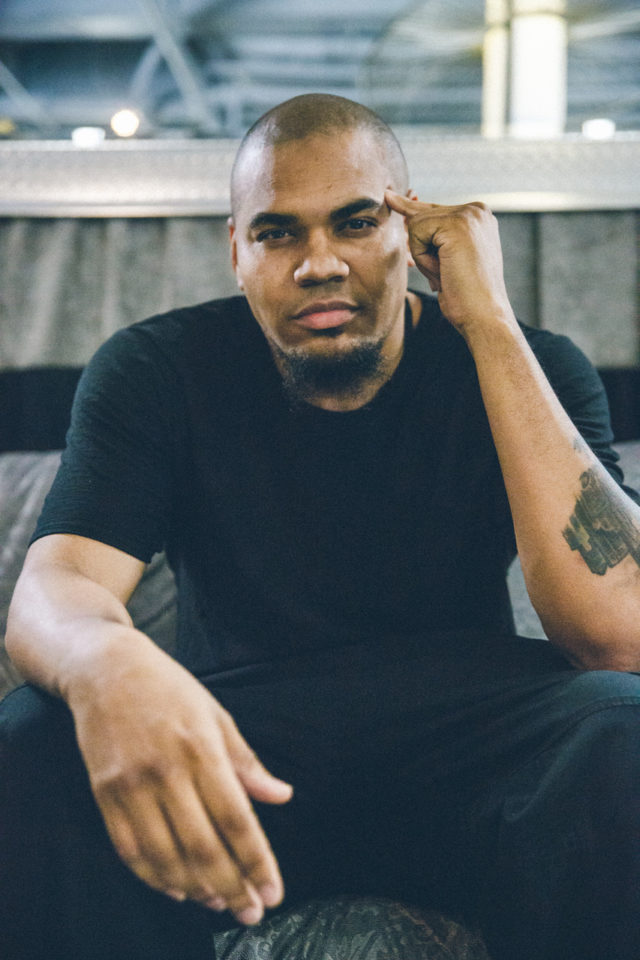
Musab, aka Sab the Artist, aka Beyond, has gone through his fair share of personal transformations. He started writing lyrics when he was 9, back then the child of a single mother in a poor neighborhood in Minneapolis. As a teenager he was a member of one of the city’s preeminent hip hop tribes, the Headshots. Later he co-founded the indie hip hop label Rhymesayers Entertainment with Sean Daley (Slug), Anthony Davis (Ant) — both of Atmosphere, who Musab is currently on tour with — and Brent Sayers (Siddiq). Now he’s 42, living in Los Angeles with a wife and five kids.
His newest release is a personal exposé of a man coming to terms with all those versions of himself, speaking with a newfound authority about the dying genre of indie hip hop, the life-changing experience of fatherhood and what it means to be a black man in today’s America.
For the past five years, Musab’s been telling everyone that indie hip hop is dead. That’s because, he says, it is a definitional genre. Back in the day, independent musicians got their title by default, by operating outside of the commercial landscape and below the mainstream radar. Back then, they had no choice.
In the 1990s Musab’s independent label Rhymesayers formed in Minneapolis as one of many sprouting up around the country. For most of them, the hope wasn’t just to, as they say, “own your masters,” but to maintain complete control over their artistic aesthetic and process. Over time, indie hip hop evolved into a genre of its very own, but one always doomed for extinction.
To explain his point, Musab points to the article, “Underground Hip-Hop is Dead — Welcome to the Mainstream,” on DJbooth.net, which says:
“The internet age gave ‘independent’ artists the platform their art deserves — one where their work could easily be broadcast across the entire globe, without having to sign on the dotted line or spend hundreds of thousands of dollars on radio promotion — and in the process, allowed those who were operating underground to finally see the light of day.”
The death of the term left a swath of artists struggling to define themselves, like Musab and the roster at Rhymesayers who had, for decades, formed their identities in accordance with the subversive, alternative ethos of the scene.
Musab recognizes there is still a beating heart there, albeit currently without a name, something that “owes to the aesthetic of the music, which owes to the process of how you came up with the sound,” he says.
We might not know what to call it, but we know it when we hear it because it’s simple — just lyrics laid over infectious beats. The nakedness of the infrastructure makes it hard to hide anything behind production and dubbing. Instead the process allows for an exhibition of the power of simplicity, at its best revealing the inner workings of the rapper. Or, as Musab puts it:
“It’s this almost intangible sonic quality that just feels right,” he says. “Underground music happens as a part of the natural evolution of the artist as a human being.”
More than any of his releases of the last decade, Musab’s latest album, Intellectual Property, released from his partnership with Ink Well under the name MInK, has that feeling. It’s smart without being tricky, insightful without being pretentious and absolutely vulnerable.
“It’s funny because it’s good, really good, but making the music felt easy,” he says. “It was all of the personal work that went on behind the scenes that was hard.”
Musab proceeds to open up about growing up with his single mom and aunts in Minneapolis and of all the hard times he went through as an artist and man, trying to do the right things while trying to make ends meet. He talks about the anger that came up along the way. He talks about becoming a family man and learning how to give a better life to his kids. He talks about all the time he spent in anger management and therapy. But mostly he talks about the hard work of coming to look himself in the mirror and learning to do what it takes to become the man that he always wanted to be.
“I didn’t have anyone tell me what to do, but I fixed myself, got myself better as a person. And only then was I able to expose it more musically,” he says. “It’s like what Jay Z said in his November interview with the New York Times that, ‘The hardest thing is seeing pain on someone’s face that you caused, and then have to deal with yourself.’
“What he’s saying is what we all go through, I’ll say, as black men, specifically as a part of that community. We have to learn to expose our emotions.”
He says this as a parent, but also, importantly, as a once indie artist continuing to make music beyond the passing of his genre. At the heart of both versions of the man is the same authentic, if unnameable quality. It’s as audible in the sound of his music as it is in the tone of his voice when he says:
“I always tell my kids that I owe them the truth. Like, out of anything I owe you, I owe you truth.”
On the Bill: Atmosphere — with Musab + Ink Well (MInk), deM atlaS, The Lioness, DJ Keezy. 8 p.m. Thursday, Dec. 7, Ogden Theatre, 935 E. Colfax Ave., Denver. Tickets are $29.95 in advance, $35 at the door.
8 p.m. Wednesday, Dec. 13, Boulder Theater, 2032 14th St., Boulder. SOLD OUT.














